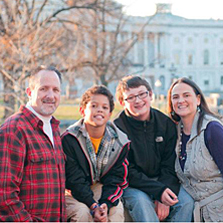
John Wesley, the founder of the Methodist movement, considered caring for those imprisoned to be one of the highest priorities in his ministry. That legacy has been carried forward by the many passionate United Methodists today who are committed to ministries of healing and restoration for the millions impacted by the U.S. criminal justice system.
So, it was horrifying to realize last year that the United Methodist Church owned nearly one million dollars in stock in private prisons corporations Corrections Corporation of America (CCA) and GEO Group. Dispensing justice not as a public trust, but rather as an item for sale in the marketplace has dramatically accelerated the incarceration of mass numbers of people, particularly people of color. While United Methodists have been caring for those imprisoned and fighting to lessen the number of people incarcerated, our church has been profiting from corporations making billions of dollars from the incarceration of people of color. It was a sickening realization. Profiting from stock in CCA and GEO Group is a betrayal of all that we stand for and believe in as United Methodists and followers of Jesus.
As many are today, Jesus also was wrongly accused and convicted, abused by his captors while in custody, and put to death even though he was innocent. Jesus’ death was the result of collusion between religious and political leaders who wanted to maintain societal control, who feared the subversive movement Jesus had started. As the ACLU’s David Shapiro tells us in his excellent report, “Banking on Bondage: Private Prisons and Mass Incarceration,” private prison companies like CCA and GEO Group are raking in massive profits and, in order to do so, dramatically increasing the population of those imprisoned. To secure those profits, private prison companies often hire lobbyists to ensure that incarceration rates continue to rise. The sad truth is that the same collusion between religious, economic and political forces that killed Jesus to maintain the status quo is alive and well today.
But we were determined to end the collusion of which our church was a part.
We decided that in addition to conversations between leaders in the church, we wanted to alert United Methodists about our profiteering from private prisons and provide a means of making their voice heard. We started a petition calling for immediate divestment of stocks in CCA and GEO Group. The response was quick and intense. United Methodists were outraged because they knew that private prisons corporations represent values that are antithetical to the values of compassion and justice that Jesus lived and taught.
Though the response by church members has been powerful, I know how slow a large institutional bureaucracy works and I was afraid it would take years to achieve divestment. Religious collusion with destructive forces is a horrible thing to openly confess and even more difficult to break.
So, it was stunning to begin 2012 learning that the United Methodist Board of Pensions, the board that controls the investments of the United Methodist Church, decided not only to divest from CCA and GEO Group entirely, but to permanently put into place a screen that will not allow us to invest in the future into any corporation that has gross revenues of 10% or more from private prisons.
What I have heard from the many United Methodists celebrating this move is that our joy emanates from the realization that once again we can say that what we believe in — healing and restoration for those impacted by the criminal justice system — is actually what we are doing. Just from this victory, I sense already a renewed passion among United Methodists to end mass incarceration and to make the U.S. criminal justice system truly just and fair. And a major step towards that reality is to ensure that incarceration ceases to be a money-making affair for corporations like CCA and GEO Group.
Bill Mefford (pictured above with his family) is the Director of Civil and Human Rights for the General Board of Church and Society of the United Methodist Church
Learn more about private prisons: Sign up for breaking news alerts, follow us on Twitter, and like us on Facebook.


